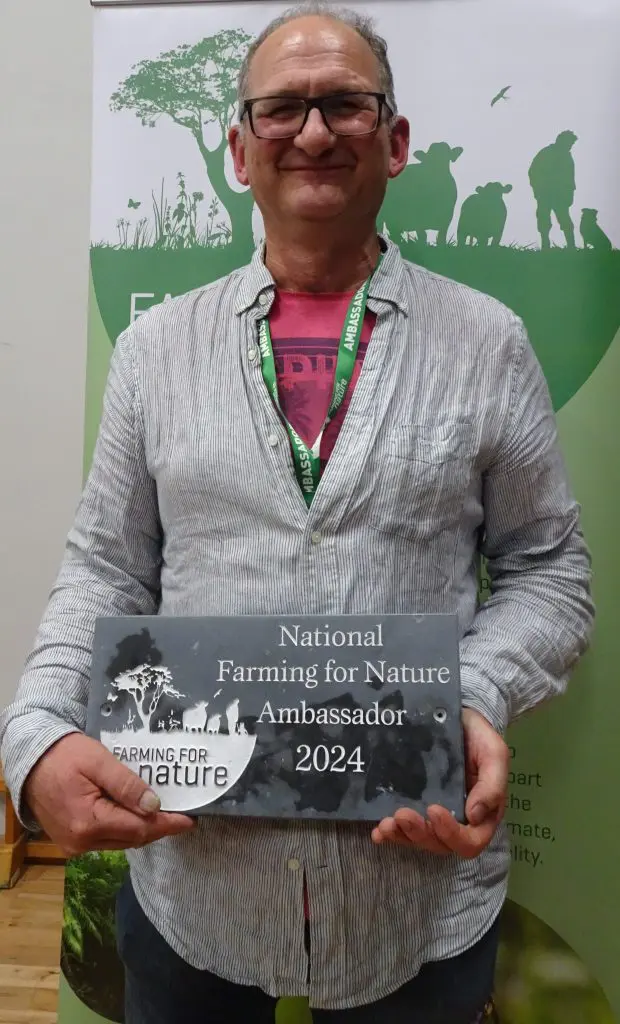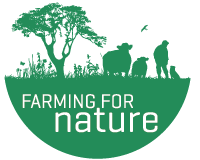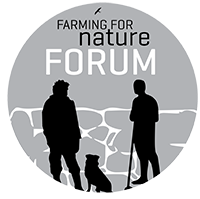- Ken Gill is an organic beef and tillage farmer near Edenderry, Co. Offaly
- Prior to converting to organics the financials weren’t making sense, now the farm is much more profitable and productive
- As well as using a strong rotation for fertility and weed suppression, Ken has also planted trees in unproductive fields
Ken Gill is a full-time organic farmer operating a suckler to beef system on his 95-hectare farm. He keeps around 60-70 suckler cows and finishes animals at 2 years, on an entirely grass-fed diet. Prior to 2013, he was farming conventionally but struggling to make it work financially. He tried organics and has been impressed with the results. ‘The grazing ground gets very little fertiliser, it’s amazing. Soil tests a few years after going organic showed P & K levels had improved rather than declined’.
He has been carefully managing soil fertility since, ensuring no ground is left bare and catching and using effluent that runs off the yard. Being organic means that crop rotation is crucial to the system for soil health and weed control. In his rotation, he produces turnip, kale and rape for fodder, which also has the benefit of breaking up the soil for subsequent crops. He then grows around 8 hectares of oats for Flahavan’s, and then introduces red clover for fertility.

‘Helping nature helps your bottom line too’ according to Ken Gill
In 2023, generally there was very poor grass growth in many areas of the country. In contrast, Ken notes in ‘our system the weather didn’t make much difference, it was more resilient compared to other farms’
The farm has 14 hectares of beautiful semi-natural woodland, which was planted 25 years ago and is managed to provide continuous cover. A further 5 hectares of semi-natural woodland has been under planted with oak in 2000 and is now starting to regenerate with an understory of native species. Large mature trees and healthy hedgerows throughout the farm provide an abundance of food and shelter resources for wildlife.
‘The grazing ground gets very little fertiliser, it’s amazing. Soil tests a few years after going organic showed P & K levels had improved rather than declined’.
Ken is a great advocate for the importance of hedgerow management and the huge difference that wildlife sensitive management can make. The hedgerows are cut in rotation every 2 – 3 years and allowed to flower. He uses a knife bar hedge cutter for trimming behind electric fences, which he finds helps the quality of the hedge. He has observed how the hedge provides a shelter, not just for cattle, but for grass too ‘you can see it after a cold east wind for a couple of weeks, there is a big difference between the exposed field and the sheltered fields.’ He cites how this is one example on his farm of ‘how helping nature helps your bottom line too’. Ken has always farmed with this approach and the abundance and quality of habitats on the farm reflect this. The margins are fenced and being organic, are free from pesticides and herbicides providing additional resource rich habitat.
The farm is also a survey site for the National Pilot Pollinator Monitoring Scheme. Ken has enjoyed learning about pollinators and especially the importance of providing pollinator friendly habitats. He has gained a strong appreciation, for the value of field margins and for the positive impact of management choices he has made. The margins, bases of hedgerows and earth banks are all free from pesticides and provide great natural nesting sites for pollinators. Ken’s farm provides a great example of a successful farm that also allows nature to thrive alongside agriculture.
To learn more about Ken’s farm, go to the Farming for Nature YouTube channel – https://www.youtube.com/@farmingfornature
Ken will be taking part in an online ‘Ask the Farmer’ Q&A on Tuesday the 15th April at 8pm. He will be sharing his expertise on how farming for nature made his farm more viable. Register here to receive the link

